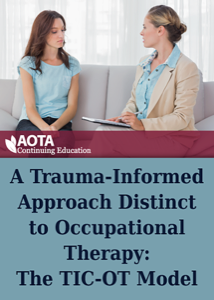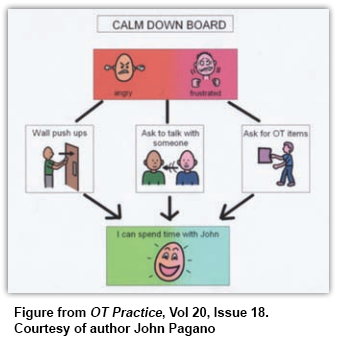How many of your clients have experienced a traumatic event at some point in their lives? Even if it’s just one client, you need to fully understand how trauma can affect occupational participation for years following the event.
Traumatic events can include physical or emotional abuse, bullying, military trauma, or a child who was separated from their families at the border.
All forms of trauma can have long-lasting adverse effects that can include an individual’s inability to cope with normal stresses and strains of daily living as well as developing chronic conditions later in life such as heart disease, obesity, depression, and more (source).
AOTA has several resources for you to freshen up your knowledge and skills with trauma-informed care.
First, check out AOTA’s Societal Statement on Stress, Trauma, and Posttraumatic Stress Disorder.
Learn How to Apply a Trauma-Informed Care Model
 The best place to start is with our new continuing education online course on trauma-informed care that goes over a model for OT practitioners to use when working with those who have experienced a traumatic event.
The best place to start is with our new continuing education online course on trauma-informed care that goes over a model for OT practitioners to use when working with those who have experienced a traumatic event.
At the end of the course you will be able to describe the prevalence and impact of trauma, explain OT’s distinct role in trauma-informed care, and describe and apply the Model of Trauma-Informed Care Distinct to Occupational Therapy (TIC-OT).
Learn more about the course and download it today ($29.95 for AOTA members, $39.95 for nonmembers). You can earn.15 CEUs (1.88 NBCOT PDUs/1.5 contact hours).
Understand Trauma’s Effects on Children & YoutH
AOTA’s School Mental Health Toolkit has several resources that can help you learn more about mental health promotion, prevention and intervention. This information sheet on Childhood Trauma has specific strategies and approaches for you to use with your clients who have experienced trauma.
 Are you aware that early adversity can affect sensory processing and childhood development? This article goes over what you need to understand if you are practicing sensory integration.
Are you aware that early adversity can affect sensory processing and childhood development? This article goes over what you need to understand if you are practicing sensory integration.
Find ideas for helping teachers and students prevent aggression, restraint and seclusion such as preparing students for upcoming transitions and helping teachers develop a quiet area where students can go when they begin noticing their triggers.
Maternal Health Needs a Trauma-Informed Care Approach, Too
Have you ever considered the needs of new mothers when it comes to grief and trauma? Some mothers experience posttraumatic stress disorder after childbirth. And others will have psychosocial needs during perinatal periods.
Learn about maternal mental health here.
More Resources
What other trauma-informed care resources do you recommend? Tell us about it in the comments.
Also, join the Mental Health SIS community to discuss related topics with your peers.